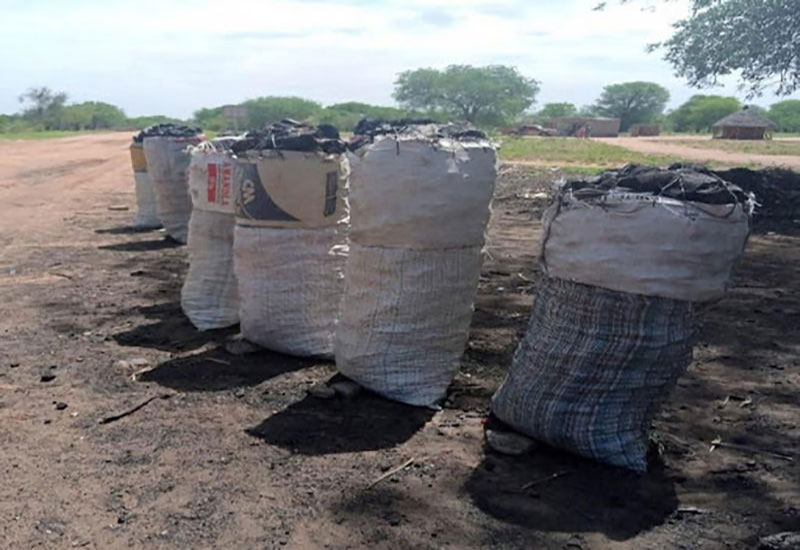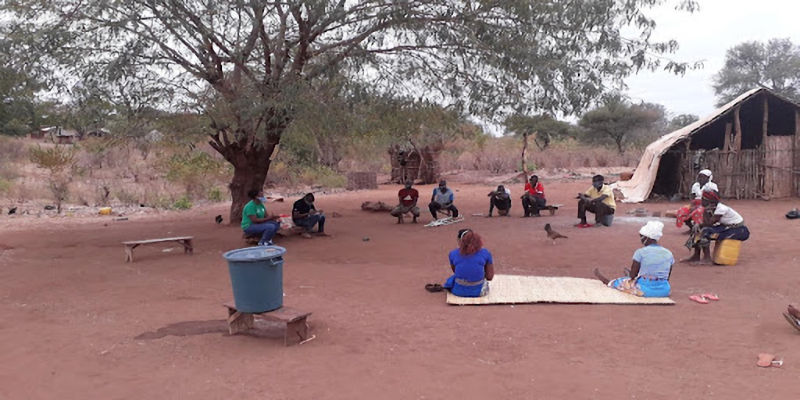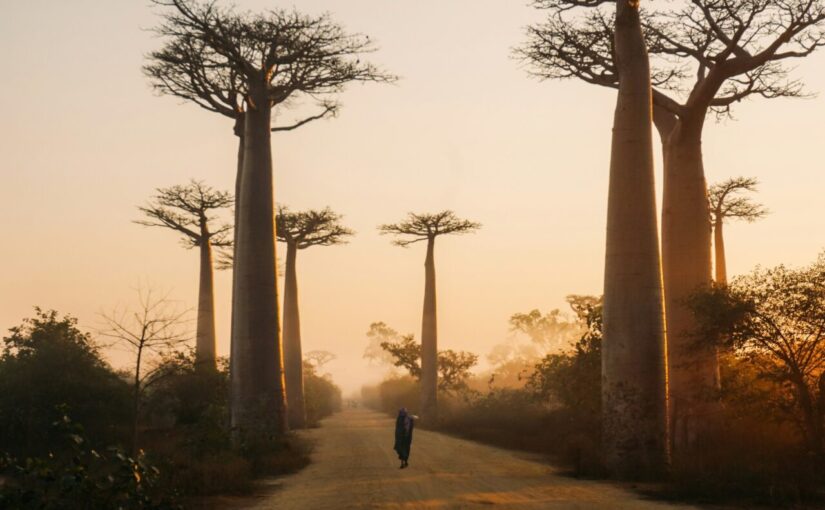Understanding changes in the charcoal and baobab value chains in rural Mozambique. Blog Também Disponível em Português!
IGDC Lecturer Judith Krauss and Eduardo Castro Jr from Universidade Eduardo Mondlane join us in this blog to share their recently published study into understanding livelihood changes in the charcoal and baobab value chains during Covid-19 in rural Mozambique.
Charcoal and baobab, and the value chains which produce and sell them to consumers, offer key livelihood sources within rural Mozambique. The ‘tree of life’, as baobab is also known, can be used for food (fruits and leaves), fiber (bark) and medicine (all parts), and survives droughts through stem-stored water.

They equally play an important role in a crisis, as one of our interviewees explained: ‘In times of drought, people used to make baobab pap to have something to eat’. In these communities, baobab fruits are collected and sold to be turned into baobab powder for food and beverage manufacturing. Similarly, charcoal, as in much of sub-Saharan Africa, is sold to urban centres as a key cooking fuel, and constitutes a crucial cash income source.
As with all elements of life, COVID-19 had a significant impact on these forms of livelihood within Mozambique and beyond.
Our study recently published in Geoforum, highlights the importance of collective power and socially minded stakeholders in protecting small-scale livelihoods in times of crisis.
Livelihood impacts of Coping with Covid
The study (conducted by Judith Krauss, University of York, UK; Eduardo Castro Jr., Universidade Eduardo Mondlane, Mozambique; Andrew Kingman and Milagre Nuvunga from the Micaia Foundation, Mozambique/UK; and Casey Ryan, University of Edinburgh) is part of a larger project implemented at the start of the Covid pandemic in 2020, ‘Livelihood impacts of coping with Covid-19 in rural Mozambique‘ (CwC). The project traced the differentiated impacts of Covid-19 on livelihoods in rural communities across Mozambique through weekly phone interviews, highlighting that trading and transport restrictions made market access more difficult or impossible. What is more, Covid-related restrictions exacerbated socio-economic vulnerabilities such as age, gender, low income, and created new exposures.
The wider study showed, however, that trading and transport restrictions to reduce Covid-19 transmission, had very different repercussions for different domestic, regional and global value chains. As empirical data were sparse on particularly Covid-19’s implications for value-chain stakeholders’ local livelihoods, we conducted over 270 weekly phone interviews with panellists in six rural Mozambican communities in 2020. Our research traced firstly how the baobab and charcoal value chains were affected by Covid non-pharmaceutical interventions (NPIs), particularly in terms of producers’ livelihoods. Secondly, we asked how our findings advance our understanding of how power and risk asymmetries as well as different value-chain stakeholders’ orientations affect livelihoods.
Conceptual framework: combining convention theory, livelihoods and value chains with an emphasis on power and risk
Our conceptual lens combined value-chain and production-network analysis, convention theory and livelihood resilience focusing on power and risk. Value chains and production networks analysis investigates the cross-border genesis of goods and services involving a multitude of stakeholders across private sector and public sectors. In the past, however, it has predominantly focused on lead firms, often based in wealthy countries, placing less emphasis on the livelihoods generated for and priorities of producers.
Given the shock of the Covid pandemic and its repercussions for incomes, livelihood resilience is a useful concept: “the capacity of all people across generations to sustain and improve their livelihood opportunities and well-being despite environmental, economic, social and political disturbances” (Tanner et al., 2015). An emphasis on livelihoods generated through value chains equally draws attention to the asymmetries of power and risk inherent in value chains, highlighting differences between e.g. the collective power of women baobab collectors, and the market power of dominant charcoal buyers. Because of these unequal starting points among small-scale producers vis-à-vis more powerful stakeholders in value chains, convention theory is particularly important: it highlights that different value-chain stakeholders, with different levels of power, will have different understandings of ‘quality’ or what matters most in the value chain. Some will prioritise market-based orientations, meaning that price is the deciding factor, while other stakeholders will understand the socio-environmental circumstances of production to be most important, with a more socially minded or ‘civic-based’ outlook.
We believe the framework we have constructed will be useful beyond our investigation to highlight the implications of advancing environmental change, including climate change, for the most vulnerable stakeholders’ livelihoods.

Empirical findings: collective power and socially minded stakeholders matter
We found that Covid trading and transport restrictions considerably re-shaped value chains, albeit in different ways. The global baobab value chain continued to provide earnings particularly to women, when other income sources disappeared partly or entirely. The reason was that civic-minded stakeholders, including a social enterprise involving the women collectors and an institutional donor as well as a certifying body, altered their operations to accommodate pandemic restrictions to shift risk away from the most vulnerable value-chain stakeholders in Guro and Tambara districts, Manica province, in Mozambique. The dynamics meant that the social enterprise selling organic baobab powder acquired new buyers both internationally and domestically, meaning the value chain acquired a domestic dimension thanks to the collective power of women collectors and the civic-based orientation of public-sector stakeholders as well as the social enterprise.
By contrast, producers involved in the domestic, solely market-oriented charcoal value chain saw their selling opportunities and incomes reduced. Normally, small-scale charcoal producers in our communities rely on train circulation to sell charcoal to urban wholesale buyers from big centres such as the capital Maputo. However, the pandemic restrictions stopped trains, meaning that small-scale charcoal producers were entirely dependent on passing lorries to buy from them, with their weakened bargaining position leading to low volumes of sales and low prices. Consequently, charcoal-dependent communities in Mabalane and Mapai districts, from Gaza province, reported higher levels of hunger and food insecurity. Unlike the baobab value chain, producer fragmentation meant there was no collective power with which to contest passing traders’ or charcoal retailers’ power, with the value chain solely dominated by market-based, price-focused conventions.
In sum, our paper argues that local livelihoods were more resilient under Covid NPIs if civic-based conventions and collective, social power were present.
In summary, our paper argues that local livelihoods were more resilient under Covid NPIs if civic-based conventions and collective, social power were present.
About the authors

Dr Judith Krauss is a lecturer at the University of York’s Interdisciplinary Global Development Centre (IGDC), teaching on the BA in Global Development programme.
Her research interests focus on the political ecology of nature-based value chains, decoloniality and justice in conservation, and the Sustainable Development Goals (SDGs).

Eduardo Castro Jr. is a young Mozambican, member of the Future Leaders Network on Early Warning Early Action, with relevant work experience in rural development, forecast-based financing, early warning systems, disaster risk reduction & management, as well as climate change adaptation & resilience.


One thought on “Livelihood changes during Covid-19: the role of power, risk and civic-based stakeholder conventions”
Comments are closed.